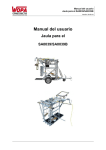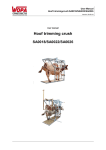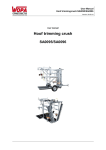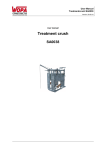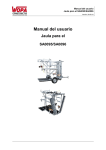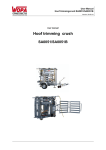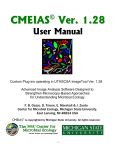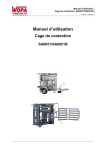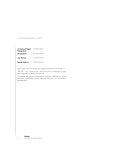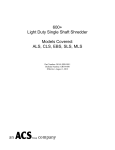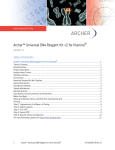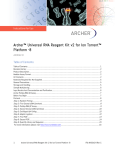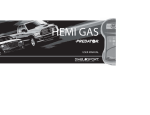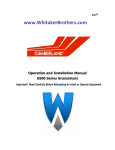Download Hoof trimming crush - WOPA Klauwverzorging Nederland
Transcript
User Manual Hoof trimmingcrush:SA0030/SA0039B Version: 24-09-14 User manual Hoof trimming crush SA0039/SA0039B User manual Hoof trimmingcrush:SA0039/SA0039B Version: 24-09-14 Manufacturer: Wopa Constructiebedrijf BV Rector Hulshofstraat 10 7135 JV Harreveld The Netherlands : : Email: Website: +31-(0)544 372415 +31-(0)544 372445 [email protected] www.wopa.com © Copyright 2014 No part of this publication may be reproduced, stored in a search system or transferred in any form whatsoever, either electronically or mechanically, or by photocopying or recording, or in any other way whatsoever without prior written consent from Wopa Constructiebedrijf BV (hereinafter in this manual also referred to as “Wopa”). Page 2 of 34 User manual Hoof trimmingcrush:SA0039/SA0039B Version: 24-09-14 Introduction Wopa Constructiebedrijf BV specialises in development and manufacture of hoof trimming and treatment crushes for cows and bulls for professional users as well as for cattle farmers. Our crushes are developed and manufactured in the highest possible quality, according to the strictest requirements as far as safety, user convenience, animal welfare and hygiene are concerned, always striving for an optimum. This manual contains information and instructions relevant to installation, operation and maintenance of the machine. The machine is not suitable for use in explosive hazardous environments. All persons responsible for operation must, at minimum, read and comprehend the sections on operation and safety of these operating instructions. All persons responsible for assembly, installation, maintenance and/or repair must read and comprehend all these operating instructions. The user is responsible for interpretation and use of this manual under all conditions. Should you have any doubts or questions regarding the correct interpretation, please contact the owner or the supervisor. Keep this manual nearby the installation and within the users' reach. Keep a log of all major maintenance work, adaptations to the installations and observations, see Annex 8.1. Changes to the installation/machine are not permitted without prior written approval from the supplier. Contact the supplier for any special maintenance work not included in this manual. Comply with the safety requirements as given in Section 3 at all times. Proper functioning as well as the safety of the system can only be guaranteed if the recommended maintenance is carried out correctly and on time. Page 3 of 34 User manual Hoof trimmingcrush:SA0039/SA0039B Version: 24-09-14 Warranty The warranty is subject to the following limitations. The warranty period for products supplied by Wopa is 12 months from the date on the purchasing document. The warranty is limited to production and material errors and therefore does not cover any breakdowns due to a part of the product exposed to any type of wear. Normal wear as can be expected from using this product is therefore excluded. 1. Wopa’s responsibility remains limited to replacing defective parts; we recognise no claims to any other type of loss or costs. 2. The warranty is automatically void in case of overdue or poorly implemented maintenance. 3. Should you have any doubts regarding maintenance work or should the machine fail to operate correctly, contact the supplier. 4. The warranty does not apply if the defect is the result of incorrect or negligent use or of maintenance carried out contrary to the instructions in this manual. 5. The warranty is void if any repairs or adaptations are made to the product by third parties. 6. Defects ensuing from damage or accidents caused by external factors are excluded from the warranty. 7. If we replace any parts in accordance with the obligations ensuing from this warranty, the parts we replaced become our property. Page 4 of 34 User manual Hoof trimmingcrush:SA0039/SA0039B Version: 24-09-14 Table of Contents INTRODUCTION............................................................................................................................................... 3 WARRANTY ..................................................................................................................................................... 4 TABLE OF CONTENTS .................................................................................................................................... 5 EC CONFORMITY DECLARATION (COPY)...................................................................................................... 6 OVERVIEW OF SYMBOLS ............................................................................................................................... 7 PICTOGRAMS.................................................................................................................................................. 8 1. TECHNICAL INFORMATION..................................................................................................................... 9 2. DESCRIPTION OF THE INSTALLATION................................................................................................. 10 2.1. 2.2. 2.3. 3. SAFETY .................................................................................................................................................. 16 3.1. 3.2. 3.3. 4. LOCATION ........................................................................................................................... 18 CONNECT THE MACHINE. ....................................................................................................... 21 PREPARING FOR TRANSPORTATION. ....................................................................................... 21 OPERATION ........................................................................................................................................... 22 5.1. 5.2. 5.3. 5.4. 6. GENERAL ............................................................................................................................ 16 DURING NORMAL USE ........................................................................................................... 17 OPERATING PERSONNEL ....................................................................................................... 17 INSTALLATION ...................................................................................................................................... 18 4.1. 4.2. 4.3. 5. DESCRIPTION OF THE MAIN COMPONENTS SA0039/SA0039B .................................................. 10 ELECTRICAL INSTALLATION .................................................................................................... 12 HYDRAULIC INSTALLATION ..................................................................................................... 14 STARTING UP....................................................................................................................... 22 EMERGENCY STOP. .............................................................................................................. 23 PRODUCTION....................................................................................................................... 24 HOOK UP THE FRONT LEG...................................................................................................... 25 MAINTENANCE ...................................................................................................................................... 26 6.1. 6.2. 6.3. 6.4. 6.5. 6.6. MAINTENANCE DIAGRAM ....................................................................................................... 26 CLEAN THE MACHINE. ........................................................................................................... 28 LUBRICATION OF REAR GATE ................................................................................................. 28 CHECK OIL LEVEL/REPLACE OIL. ............................................................................................. 29 CHECK PLAY IN THE WHEELS. ................................................................................................ 30 PARTS ................................................................................................................................ 31 7. DISPOSAL AS WASTE ........................................................................................................................... 32 8. APPENDIX .............................................................................................................................................. 33 8.1. LOGBOOK............................................................................................................................ 33 LIJST MET AFBEELDINGEN FIGURE 1: OVERVIEW SA0039/SA0039B ............................................................................................. 10 FIGURE 2: OVERVIEW OF THE ELECTRICAL INSTALLATION ......................................................................... 12 FIGURE 3: OVERVIEW OF THE HYDRAULIC INSTALLATION .......................................................................... 14 FIGURE 4: LOCATION OF CRUSH ............................................................................................................ 18 FIGURE 5: DETAILS OF CONVERSION FROM TRANSPORT SET-UP TO WORKING SET-UP. ................................. 19 FIGURE 6: DETAIL OF HOOKING UP FRONT LEG ........................................................................................ 25 FIGURE 7: LUBRICATION OF REAR GATE.................................................................................................. 28 FIGURE 8: HYDRAULIC FLUIDS TO BE USED ...................................................................................... 29 Page 5 of 34 User manual Hoof trimmingcrush:SA0039/SA0039B Version: 24-09-14 EC conformity declaration (copy) We, Wopa Constructiebedrijf BV Rector Hulshofstraat 10 7135 JV Harreveld The Netherlands : : Email: Website: +31-(0)544 372415 +31-(0)544 372445 [email protected] www.wopa.com declare, entirely under our own responsibility, that the product: machine : type: Hoof trimmingcrush SA0039 to which this declaration pertains, is consistent with the stipulations in Directives: 2006/42/EC 2004/108/EC (Machine Directive) (EMC Directive) the following standards were taken into account: NEN-EN-ISO 12100 NEN-EN 349 NEN-EN ISO 13849-1 NEN-EN 4413 NEN-EN 60204-1 Safety of machinery. Basic definitions, general design principles. Safety of machinery – Minimum gaps to avoid crushing of parts of the human body. Safety of machinery – Parts of the control systems with a safety function – Section 1: General design principles Hydraulics – General rules and safety requirements for systems and their components Safety of machinery – Electrical equipment of machines Section 1: General requirements The undersigned is authorised to compile the Technical Dossier: The Netherlands - Harreveld, September 2014 J.W.A. Wopereis Managing Director Page 6 of 34 User manual Hoof trimmingcrush:SA0039/SA0039B Version: 24-09-14 Overview of symbols The following symbols are used for all actions that jeopardise the safety of the user and/or technician and require caution. Attention! Hazard: High voltage! Hazard: High temperature! Tip: Offers quick insight or tips to carry out certain actions more easily and simply. Page 7 of 34 User manual Hoof trimmingcrush:SA0039/SA0039B Version: 24-09-14 Pictograms A number of pictograms and alerts are affixed to the installation to indicate possible risks to users, among other things. Pictogram Description Location Type plate On the machine frame Read the user manual Wear safety goggles when operating machine Wear hearing protection when operating machine. On the machine frame On either side of the frame Warning pictograms System under pressure. Warning pictograms for mechanical and electrical hazards On the machine frame Crushing hazard By the rear gate, if present. ATTENTION! Check regularly whether the pictograms and signs are still clearly recognisable and legible. Replace if this is no longer the case. Page 8 of 34 User manual Hoof trimmingcrush:SA0039/SA0039B Version: 24-09-14 1. Technical information SA0039 SA0039B - 10 to 40 - 10 to 40 < 75 < 75 dB(A) Machine dimensions Length Width Height Weight 2000 1850 2000 475 2000 1200 2000 475 mm mm mm kg Maximum product dimensions Length Width Height Weight 3600 1850 2320 600 3000 1200 2150 600 mm mm mm kg General Ambient temperature during operation Noise production Electrical connection Power supply National voltage Required fuse Connected value Hydraulic installation? Maximum operating pressure Tank volume Type of oil Data for road transport Axial load Maximum drawbar load Coupling Connection plug Standard / option 1 phase / 3 phase ˚C 230/400 8.7/5.9 1.5/2.5 1 phase / 3 phase 230/400 8.7/5.9 1.5/2.5 120 5.5 See Figure 7 120 5.5 See Figure 7 bar litre 750 100 ISO 55 mm 7 or 13 - kg kg pole * see electrical diagram Page 9 of 34 V A kVA User manual Hoof trimmingcrush:SA0039/SA0039B Version: 24-09-14 2. Description of the installation FUNCTION This section gives an overview of the most important components and functions. If detailed information is available elsewhere in the manual, you are referred to the specific sections. The design of your crush may differ from the figures below. 2.1. Description of the main components SA0039/SA0039B FUNCTION The SA0039 and SA0039B were developed especially for dairy cattle hoof trimming. Version SA0039 is equipped with an axle with a draw bar and is suitable for transport on public roads. The main components of the crush are shown in the illustration below: Options in this illustration: Rear gate, folding gates, socket. 5 1 7 6 10 3 11 12 2 4 8 9 Figure 1: Overview SA0039/SA0039B Main components SA0039/SA0039B: Figure 1 Component 1 Rear gate (option) Description The photo in the illustration shows the version with the rear gate option because this is nearly always chosen in actual practice. Page 10 of 34 See Section User manual Hoof trimmingcrush:SA0039/SA0039B Version: 24-09-14 Figure 1 Component Description 2 Electrical connection cable 3 Front gate 4 Front leg support 5 Hind leg (hydraulic) 6 Transport set (light bar) (SA0039) Belly strap (hydraulic) Transport set (axle) (SA0039) Transport set (draw bar arm) (SA0039) Transport set (manual winch) (SA0039) 7 8 9 10 11 Folding iron gates 12 Belly strap After the cow is moved into the crush, the rear gate is placed against the back of the animal hydraulically. The standard crush is equipped with a rump chain, which is stretched tightly behind the animal and secured on the right hand side. The crush must be connected to the electricity network for power supply for operation and the hydraulic power unit. The front gate can be set to 3 positions with the hydraulic controls: Entirely open: the cow can exit the crush at the front. Partially open: the cow can move its head through the front gate but not its shoulders. Closed: the front gate is closed behind the animal's head. The cow’s front leg can be secured to the front leg support with a rope and hook so the leg is secured and can be treated. The standard version is hydraulic. The side that is not used remains suspended in an elastic band so this rope stays tight and does not get tangled up. After the belt is attached round the hind leg, the leg can be lifted with the hydraulic winch so the hoof can be treated. A light bar with a license plate is attached to the crush for transport on public roads. Once the cow is moved into the crush, the belly strap is lifted hydraulically behind the front legs. An axle with mudguards is attached to the crush for transport on public roads. A draw bar arm is attached to the crush for transport on public roads. With the manual winch on brake, the crush can be lifted from and into the transport position on the left side of the crush. A hydraulic option is also available. As an option, the crush can also be equipped with folding gates. This belly strap is lined with a rubber layer so it ends up lying nice and flat on the floor when you lower it so the cow simply steps over it. Page 11 of 34 See Section - 5.4 User manual Hoof trimmingcrush:SA0039/SA0039B Version: 24-09-14 2.2. Electrical installation FUNCTION The electrical installation supplies the power for the hydraulic power unit, lighting and sockets. See the electrical diagram on the control panel of every crush for the rest of the structure and controls of the electrical installation included in the delivery. The placement of the control components on your installation may differ from the photo below. ATTENTION! Work on the electrical installation can only be carried out by a technical expert. 2 1 5 3 4 Figure 2: overview of the electrical installation The installation consists of the following components Figure 2 Component 1 2 3 Power supply cable Emergency stop Power unit start/stop button Description To connect the machine to the power supply. The emergency stop switches off all operations. Pushing the button switches the power unit on or off. You can order the hydraulic valves with automatic shut-off as an option, in which case the hydraulic power unit starts when the valve is operated and Page 12 of 34 Section / location User manual Hoof trimmingcrush:SA0039/SA0039B Version: 24-09-14 Figure 2 Component 4 Three-phase current switch Description 5 Sockets (option) does not have to be started or stopped separately. This switch is only present if the controls are suitable for 3-phase current (option). The switch must be set to position 1 or 2, depending on the direction of rotation of the power network one wants to connect to. The hydraulic power unit can only pump oil in 1 of these positions. If no oil is being pumped, the switch must be flipped immediately to prevent damage to the installation. The grinders can be connected to these. Page 13 of 34 Section / location User manual Hoof trimmingcrush:SA0039/SA0039B Version: 24-09-14 2.3. Hydraulic installation FUNCTION The various functions are driven by means of the hydraulic installation See the hydraulic diagram for a detailed description of the installation. The placement of the control components on your installation may differ from the photo below. ATTENTION! Work on the hydraulic installation can only be carried out by a technical expert. 1 5 2 Figure 3: overview of the hydraulic installation The installation consists of the following components Figure 3 1 Component Description Valve block in general The valves control the following functions: Hind legs Front gate Hydraulic shaft (option SA0039) Belly strap Rear gate (option) To operate the valves, operating levers have been installed to allow operating from either side (for most functions). Page 14 of 34 Section / location User manual Hoof trimmingcrush:SA0039/SA0039B Version: 24-09-14 Component Description 2 Power unit 3 Front leg valve Figure 3 See the type plate on the motor to connect the machine to the power supply. It operates the front leg winch. As an option, the crush can be equipped with a hydro-motor on each side. Page 15 of 34 Section / location User manual Hoof trimmingcrush:SA0039/SA0039B Version: 24-09-14 3. Safety 3.1. General The guarantee will lapse and no liability will be accepted in the event of damage caused by repairs and/or modifications not authorised by the supplier. In the event of faults please contact the supplier. The working area around the installation must be safe. The owner of the installation must take the necessary precautionary measures in order to operate the installation safely. Starting up the installation in an area with a risk of explosion is prohibited. The installation has been so designed that production is safe under normal ambient conditions. The owner of the installation must ensure that the instructions in this manual are followed in practice. The safety features provided must not be removed. Correct operation and safety of the system can only be guaranteed where maintenance is carried out correctly and in good time, as prescribed. Where work is to be carried out on the installation it must be disconnected from the power supply, the power supply must be locked off and the system must be depressurised. There is a risk of trapping when operating driven moving parts. It is the operator's responsibility to ensure that the installation is only started up when no parts of his own or other people's bodies are in the vicinity of the trapping zone. Only authorised persons appointed by the owner may carry out work on the electrical installation. Ensure by means of internal procedures and supervision that all applicable power supplies have been switched off. The installation must not be used during cleaning, inspection, repairs or maintenance, and must be disconnected from the electrical supply by means of the plug and/or the main switch. Welding work must not be carried out on the installation unless the cable connection to the electrical components has first been disconnected. The power supply to the control cabinet must not be used for the connection of machinery other than the hand tools provided for. Page 16 of 34 User manual Hoof trimmingcrush:SA0039/SA0039B Version: 24-09-14 3.2. During normal use Check before commencing operations that no work is being carried out on the installation and that it is ready for use. Unauthorised persons must not enter the operational area of the installation. It is the operator's task to check this. Components of the hydraulic system may reach high temperatures. Contact with these components may cause injury. 3.3. Operating personnel Operating personnel must be aged 18 or above. Only authorised persons may carry out work with or on the installation. Only work for which proper training has been received must be carried out. This applies both to maintenance activities and normal use. The operating personnel must be familiar with all potential situations, so that rapid and effective action can be taken in an emergency. Where a member of operational staff observes defects or risks or is not in agreement with the safety measures, this must be reported to the owner or the manager. Safety footwear is mandatory. Suitable work clothing is mandatory. All employees must observe the safety instructions to avoid presenting a risk to themselves and others. Comply strictly with the operating instructions at all times. Page 17 of 34 User manual Hoof trimmingcrush:SA0039/SA0039B Version: 24-09-14 4. Installation EXPLANATION Consult the technical data and the circuit diagram provided for the correct specifications. 4.1. Location CAUTION The machine must be transported and installed upright. Place the machine on a level and stable substrate Take account of the instructions in Section 3 when carrying out any activity. Failure to follow these may lead to serious injury. 1 2 3 Figure 4: location of crush Page 18 of 34 User manual Hoof trimmingcrush:SA0039/SA0039B Version: 24-09-14 No. 1. What to do Install the anti-tipping bar 2. Slide out the front gate stops (SA0022/SA0026/SA0 039B). 1 Action Slide the anti-tipping bar (Figure 4:3) into the recesses in the crush to increase lateral stability. The stops (Figure 4:1) are slid in for transportation. Press in the locking balls (Figure 4:2). Slide out the stops to allow maximal travel of the front gate. 3 2 6 7 8 Result 4 5 9 Figure 5: details of conversion from transport set-up to working set-up. No. 1. What to do Tip the crush back. 2. Take tension off the belly belt. 3. Remove the drawbar. 4. Remove the lighting board. Fold the rear gate away. Tip the crush forwards. Remove the mudguards 5. 6. 7. Action Tip the crush so that the drawbar is clear of the ground. The belly belt (Figure 5:1) holds the drawbar under tension during transportation. Loosen the belly belt. Remove the locking pins (2*) (Figure 5:2) and slide the drawbar frame out of the recesses. Remove the lighting board from the crush. Raise the rear gate. Lift the rear of the crush so that it tips forwards. Loosen the locking elements (Figure 5:3) and lift the mudguard out of the adapter. Page 19 of 34 Outcome This stabilises the drawbar during transportation. Lift by the rear gate for less force. User manual Hoof trimmingcrush:SA0039/SA0039B Version: 24-09-14 8. 9. Tip the axle. Slide out the front gate stops. Take the tension off the locking pin by bringing the hand winch (Figure 5:4) up to tension. Where no winch is provided there will be no tension on the lever. Remove the locking pin (Figure 5:10). Turn the winch until the weight is off the wheels and there is no longer any tension on the lever (Figure 5:5). Where no winch is provided place your right foot on the wheel and lower the lever (Figure 5:5) by hand. Ensure that nobody is standing in front of the lever or behind the crush. Remove the locking pin (Figure 5:6) from the lever. Place the lever (Figure 5:5) in the storage position (Figure 5:7) and secure with the locking pin. Rotate the winch again until the cable is under tension. Hydraulic tipping (optional) (SA0039). Remove the locking mechanism. Operate the valve until the weight is off the wheels. The stops (Figure 5:8) are slid in for transportation. Press in the locking balls (Figure 5:9). Slide out the stops to allow maximal travel of the front gate. Page 20 of 34 Caution: the locking mechanism must always be applied when preparing for transportation. User manual Hoof trimmingcrush:SA0039/SA0039B Version: 24-09-14 4.2. Connect the machine. CAUTION Check that the voltage specified on the machine plate matches the mains supply. The machine must always be connected to an earthed socket to avoid the risk of fire or electric shocks (the earth connection is coded green/yellow). The electrical installation including the sockets must be connected in accordance with local regulations. The power cable must always be free and nothing must be placed on top of it. Replace the power cable immediately if it is damaged. 4.3. Preparing for transportation. CAUTION Preparing for transportation is the reverse procedure to making ready for use (see 4.1). With crushes equipped with an axle and drawbar it is essential that all locking mechanisms are correctly installed. Page 21 of 34 User manual Hoof trimmingcrush:SA0039/SA0039B Version: 24-09-14 5. Operation CAUTION Take account of the instructions in Section 3 when carrying out any activity. Failure to follow these instructions may lead to serious injury. 5.1. Starting up No. 1. What to do Switch on the power. 2. Reset the emergency stop. Action Insert the plug in the socket. Pull out the emergency stop buttons. Page 22 of 34 Result The control unit is now ready for use. User manual Hoof trimmingcrush:SA0039/SA0039B Version: 24-09-14 5.2. Emergency stop. CAUTION No. 1. The emergency stop button must always be pressed in in the event of an emergency. All motions will cease following operation of the emergency stop button. In order to take the machine back into use after an emergency stop the emergency stop button must first be reset. Before resetting the emergency stop button it must be ensured that restarting the moving parts of the machine will not lead to a hazardous situation. Reset the emergency stop What to do Reset the emergency stop button. Action Result The machine is now Reset the emergency stop button by pulling it out or rotating it (depending ready for use. on the type installed) so that it returns to its original position. Page 23 of 34 User manual Hoof trimmingcrush:SA0039/SA0039B Version: 24-09-14 5.3. Production No. 1. 2. What to do Check that the crush is ready for use. Place the front gate ready. Action See Section 5.1. 3. Place the cow in the crush. 4. Attach the rump chain or (optional) rear gate. 5. Raise the belly belt. 6. Process a rear hoof. Process a front hoof. 7. 8. Lower the belly belt. 9. Release the crush. 10. Release the rump chain or raise the rear gate (option). Result Open the front gate so that the head of the animal can pass through but not its withers. When the front gate is closed hydraulically it will stop at the correct position and the handle can be released. This means that the holding position is always the same. Lead the cow into the crush until its head has passed through the front gate. Close the front gate. Tighten the rump chain around the animal and secure it with the hook. Or lower the rear gate hydraulically. Bring the belly belt up under the belly of the cow. Place the belt around the rear leg and raise the leg. Process the rear hoof. Allow the leg to drop and release it. See 5.4 Unhook the front gate rope from the elastic cord (if provided). Attach the front leg with the hook as shown in Figure 6. Turn the winch hydraulically until the leg is fixed to the block, then run the short tension rope past the knee of the front leg and fasten it to the side of the front leg support using the hook. Process the front hoof. Release the short tension rope. Unhook the rope. Hook it onto the elastic cord again (if provided). Reverse the winch until the belly belt is on the ground. Check that all ropes and belts have been freed. Open the front gate. Lead the cow out of the crush. Loosen the rump chain or; Raise the rear gate (option). Page 24 of 34 User manual Hoof trimmingcrush:SA0039/SA0039B Version: 24-09-14 5.4. Hook up the front leg. CAUTION To avoid injury to the front leg the rope must be applied correctly. (see Figure 6) Figure 6: detail of hooking up front leg Page 25 of 34 User manual Hoof trimmingcrush:SA0039/SA0039B Version: 24-09-14 6. Maintenance CAUTION! Always disconnect the machine from the power supply by pulling out the plug. Where a hydraulic accumulator is present this must be depressurised. Test the installation on completion of maintenance work or repairs to ensure that it can be used again safely. Only trained technical personnel may carry out the maintenance activities described or repair work. 6.1. Maintenance diagram Activity General Check on panic locks and hooks. Check ropes and chains. Check plugs, cables, controls and connections. Check that the left and right front leg ropes are hanging at equal lengths. Cleaning Clean the machine. Lubrication Grease nipples on rear gate sliding section. Other grease nipples. Hydraulic installation Check the oil level. Replace oil and filter. Axle and wheels Check play in the wheels. Check the tyre profile. Check the tyre pressures. note Daily weekly Every 100 animals Annually Every 2 years The diagram below shows the maintenance activities to be carried out. See Section Renew where damage is visible. Renew where damage is visible. Alert a competent fitter where damage is visible. Where these are driven by a single motor. 6.2 Bearing grease. 6.3 Bearing grease. Checks must be carried out after 500 cows or where leakage occurs. 6.4 6.5 Have this inspected by a competent person. Have this inspected by a competent person. Page 26 of 34 User manual Hoof trimmingcrush:SA0039/SA0039B Version: 24-09-14 Drawbar Play in ball mounting. Check the shaft bolts. Replace where minor play is evident, or see markers on the side of the ball mounting. Every 10,000 km. Page 27 of 34 User manual Hoof trimmingcrush:SA0039/SA0039B Version: 24-09-14 6.2. Clean the machine. EXPLANATION A high-pressure cleaner may be used for cleaning. Avoid bearings, winches and motors when cleaning with a high-pressure cleaner. Spraying in these areas may result in a sharp reduction in service life. 6.3. Lubrication of rear gate EXPLANATION The rear gate is slid out with the aid of gas springs fitted to the gate. To prevent grease entering the gas springs and causing damage, the gate must only be lubricated when it is fully drawn back. 1 2 3 Figure 7: lubrication of rear gate No. 1. 2. What to do Retract the rear gate. Grease the nipples. Action Attach the rear leg winch to the rear gate and tighten until the gate is fully retracted. Lubricate the rear gate nipples using a grease gun. Page 28 of 34 Result User manual Hoof trimmingcrush:SA0039/SA0039B Version: 24-09-14 6.4. Check oil level/replace oil. EXPLANATION Checking the oil level ensures that the necessary minimal amount of oil is present. The cylinders must be retracted for this purpose. The general rule is that the oil and filter should be replaced every two years. Gauging the oil level No. 1. What to do Retract the cylinders. 2. No. 1. 2. 3. 4. Check the oil level. Action Put the cylinders in the installation in their retracted position by operating the valves. The oil level must now be between the minimum and maximum levels (see instructions on "changing the oil"). Changing the oil What to do Action Result Bring the oil to the See the instruction on "gauging the oil tank. level". Empty the tank Remove the plug from the tank and allow the oil to run out until it is empty. Fill the installation. Fill the tank via the filler cap. Check the oil level. The oil must be between the two lines on the filler cap dipstick. The following types of oil are suitable for use in the hydraulic installation: Supplier BP Agip Aral Beverol Castrol Elf Esso Fuchs Kroon Oil Mobil Pennzoil Q8 Shell Sunoco Texaco Total Unil Result Summer oil Energol HLP-HM 68 OSO 68 Vitam GF 68 Inula 68 Hyspin AWS 68 Elfolna 68 Nuto H 68 Renolin D 68 Perlus AF 68 DTE 26 AW Hydraulic Oil 68 Haydn 68 Tellus 68 Sunvis 800 WR 68 Rando HD68 Azolla ZS 68 HFO 68 Figure 8: hydraulic fluids to be used Page 29 of 34 User manual Hoof trimmingcrush:SA0039/SA0039B Version: 24-09-14 6.5. Check play in the wheels. EXPLANATION Raise the wheels from the ground and feel if any play is present. If play can be detected this must be corrected by a competent person, or otherwise the bearings and seals must be replaced. Page 30 of 34 User manual Hoof trimmingcrush:SA0039/SA0039B Version: 24-09-14 6.6. Parts EXPLANATION Consult the website at www.wopa.com for information on the available options and the parts available to order. Page 31 of 34 User manual Hoof trimmingcrush:SA0039/SA0039B Version: 24-09-14 7. Disposal as waste Oil and components must not be disposed of as domestic waste. When replacing components or oil or at the end of the machines service life, ensure that all materials are collected and destroyed or reused in a legal and environmentally friendly manner. Page 32 of 34 User manual Hoof trimmingcrush:SA0039/SA0039B Version: 24-09-14 8. Appendix 8.1. Logbook The logbook must include the following: The annual maintenance work Major replacements and any accidents Modifications Tests on emergency stop buttons and safety features Date: Carried out by: (authority, technician) Description: (nature of the activities, components replaced) Page 33 of 34 User manual Hoof trimmingcrush:SA0039/SA0039B Version: 24-09-14 Date: Carried out by: (authority, technician) Description: (nature of the activities, components replaced) Page 34 of 34


































